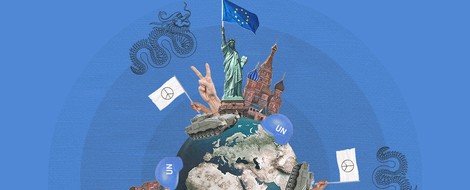Your podcast discovery platform
Curious minds select the most fascinating podcasts from around the world. Discover hand-piqd audio recommendations on your favorite topics.

piqer for: Global finds Globalization and politics Technology and society
Turkish journalist, blogger and media expert. Writes regular columns for The Arab Weekly and contributes to Süddeutsche Zeitung, El Pais and the Guardian. An European Press Prize Laureate for 'excellence in journalism' in 2014, Baydar was awarded the prestigious 'Journalistenpreis' in Germany by Südosteuropa Foundation in February 2018.
Boko Haram Is Only Another Symptom Of The Failing Nigerian State
Many are wondering how a derivative of ISIS could emerge so strongly, with a deadly force, in Nigeria. It was first in April 2014, exactly four years ago, the world heard the two ill-echoing words: Boko Haram. It was a gang of killers, whose difference from trigger-happy criminals elsewhere was that its message was disguised by an Islamist rhetoric.
Boko Haram, whose objective is the imposition of strict sharia law in the Muslim-majority northern states of Nigeria, launched its first armed operation in 2003 and is said to have anything between 6000 and 15,000 militants. This was not the first time its fighters had abducted girls, nor would it be the last, but the numbers, the brutality and the fact that the girls were Christians roused the international community ... Abubakar Shekau, the movement’s leader, appears to be unbalanced. Shekau once boasted on social media that he enjoyed ‘killing anyone that God commands me to kill the way I enjoy killing chickens and rams’.
‘Boko Haram’ translates roughly as ‘Western education is forbidden’. It was built to denounce all elements that has to do with a free lifestyle, which it fiercely blames the West for.
Nigeria is a historically, culturally and economically torn country. Its story is complicated and explosive.
Here, in an essay, Adewale Maja-Pearce explains how the nightmare of Boko Haram was born, by reviewing two fine books about the subject: Boko Haram: Nigeria’s Islamist Insurgency by Virginia Comolli and Boko Haram: The History of an African Jihadist Movement by Alexander Thurston.
Today it might be Boko Haram; tomorrow the Fulani herdsmen and their families, driven by climate change and faith. We are stumbling from crisis to crisis, as more and more illiterate young men and women pour into the streets with nothing to do but follow the next messiah or dream of escaping to Europe.
Stay up to date – with a newsletter from your channel on Globalization and politics.
